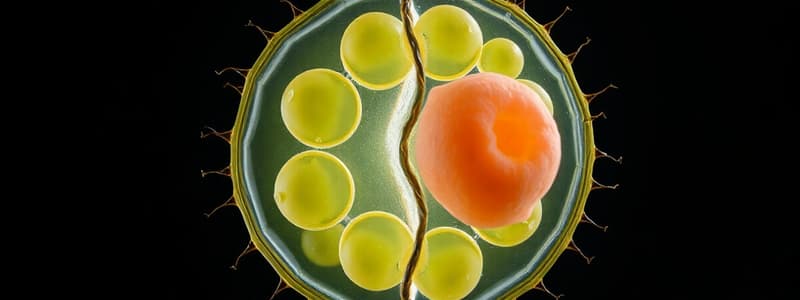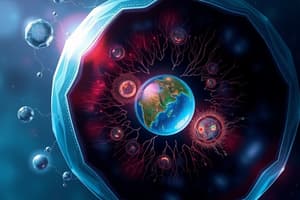Podcast
Questions and Answers
What triggers the start of the cell division process?
What triggers the start of the cell division process?
- When the cell has doubled its size
- When the cell has sufficient nutrients and appropriate size (correct)
- When the cell contains enough waste materials
- When the cell's DNA is fully replicated
Which phase of the cell cycle involves the synthesis of DNA?
Which phase of the cell cycle involves the synthesis of DNA?
- M phase
- G1 phase
- G2 phase
- S phase (correct)
What does the G1 phase primarily focus on?
What does the G1 phase primarily focus on?
- Protein synthesis only
- Separation of chromosomes
- Cell growth to the appropriate size for division (correct)
- DNA replication
What is mitosis also referred to as?
What is mitosis also referred to as?
Which of the following cells typically do not undergo mitosis?
Which of the following cells typically do not undergo mitosis?
During which phase are chromosomes replicated to form sister chromatids?
During which phase are chromosomes replicated to form sister chromatids?
What is the final phase of mitosis called?
What is the final phase of mitosis called?
What collectively encompasses the G1, S, and G2 phases?
What collectively encompasses the G1, S, and G2 phases?
Which phase of the cell cycle is primarily associated with protein synthesis?
Which phase of the cell cycle is primarily associated with protein synthesis?
What is the primary outcome of mitosis in eukaryotic cells?
What is the primary outcome of mitosis in eukaryotic cells?
What type of reproduction results in cells that are not identical to their parent cells?
What type of reproduction results in cells that are not identical to their parent cells?
In prokaryotes, what must happen before cell division can occur?
In prokaryotes, what must happen before cell division can occur?
Which stage of mitosis involves aligning chromosomes in the center of the cell?
Which stage of mitosis involves aligning chromosomes in the center of the cell?
Which of the following phases includes chromosome duplication?
Which of the following phases includes chromosome duplication?
Which checkpoint in the cell cycle is primarily responsible for checking DNA integrity before replication?
Which checkpoint in the cell cycle is primarily responsible for checking DNA integrity before replication?
What distinguishes apoptosis from necrosis?
What distinguishes apoptosis from necrosis?
What does the G1 checkpoint ensure?
What does the G1 checkpoint ensure?
What role does apoptosis play during embryogenesis?
What role does apoptosis play during embryogenesis?
What happens when the p53 gene is defective in a cancer cell?
What happens when the p53 gene is defective in a cancer cell?
What is a consequence of too much apoptosis in the body?
What is a consequence of too much apoptosis in the body?
Which of the following describes cancer cell behavior compared to normal cells?
Which of the following describes cancer cell behavior compared to normal cells?
Why is apoptosis significant in adults?
Why is apoptosis significant in adults?
Which checkpoint is the p53 protein associated with?
Which checkpoint is the p53 protein associated with?
Which of the following is a major role of apoptosis in the prostate gland?
Which of the following is a major role of apoptosis in the prostate gland?
What happens if apoptosis occurs too infrequently?
What happens if apoptosis occurs too infrequently?
What characterizes necrosis?
What characterizes necrosis?
What is a consequence of uncontrolled cell division?
What is a consequence of uncontrolled cell division?
What happens at the G2 checkpoint?
What happens at the G2 checkpoint?
What is apoptosis?
What is apoptosis?
What is the primary outcome of telophase in cell division?
What is the primary outcome of telophase in cell division?
What is the role of cytokinesis in the cell cycle?
What is the role of cytokinesis in the cell cycle?
What are cyclins and cyclin-dependent kinases (CDK) primarily involved in?
What are cyclins and cyclin-dependent kinases (CDK) primarily involved in?
How do checkpoints function in the cell cycle?
How do checkpoints function in the cell cycle?
What does the cleavage furrow do during cytokinesis in animal cells?
What does the cleavage furrow do during cytokinesis in animal cells?
In telophase, which of the following structures starts to form?
In telophase, which of the following structures starts to form?
Which of these phases follows mitosis in the cell cycle?
Which of these phases follows mitosis in the cell cycle?
What ensures the activation of target proteins in the cell cycle?
What ensures the activation of target proteins in the cell cycle?
Flashcards are hidden until you start studying
Study Notes
Introduction
- Organisms require new cells for growth, reproduction, and repair.
- New cells are derived from existing (ancestor) cells through two methods: asexual and sexual reproduction.
Asexual Reproduction
- A single parent cell divides into two identical daughter cells.
- Examples include mitosis (in eukaryotes) and binary fission (in bacteria).
Sexual Reproduction
- Two parent cells (egg and sperm) combine to form a new cell (zygote) that is not identical to the parent cells.
- Example is meiosis.
Cell Division in Prokaryotes (Binary Fission)
- Prokaryotes have a single circular DNA molecule.
- DNA replicates, and each copy attaches to the cell membrane at different positions.
- The cell elongates, pulling the DNA copies apart.
- The cell membrane pinches inward, dividing the cell into two identical daughter cells.
Cell Division in Eukaryotes
- Cell division is triggered when cells reach a certain size and have sufficient resources.
- The cell cycle dictates the stages of cell division.
Cell Cycle
- The cell cycle represents the distinct stages a cell undergoes from division to the point where its daughter cells divide again.
- Consists of three phases:
- Interphase: includes G1, S, and G2 phases.
- Mitosis (M phase)
- Cytokinesis (C phase)
Interphase
- G1 phase: cell grows, increases protein production, generates organelles.
- S phase: DNA replication occurs, forming two sister chromatids per chromosome.
- G2 phase: cell prepares for mitosis, synthesizes proteins and organelles.
- Interphase prepares the cell for mitosis.
Mitosis (M Phase)
- Division of the nucleus, occurs only in eukaryotes.
- Some cells, like nerve and brain cells, do not undergo mitosis.
- Consists of four phases:
- Prophase: chromatin condenses into chromosomes, nuclear envelope and nucleolus disappear, mitotic spindle forms from centrioles.
- Metaphase: chromosomes align at the cell equator, attached to microtubules (kinetochore fibers) from the mitotic spindle.
- Anaphase: sister chromatids are pulled apart to opposite poles by the spindle fibers.
- Telophase: chromosomes uncoil into chromatin, nuclear envelope reforms, nucleolus reappears.
- Mitosis results in two daughter cells with the same genetic information as the parent cell.
Cytokinesis (C Phase)
- Physical division of the cytoplasm, forming two separate daughter cells.
- In animal cells, a cleavage furrow forms, constricting the cell membrane.
- In plant cells, a cell plate forms, dividing the cell.
Regulation of the Cell Cycle
- Controls cell division to prevent uncontrolled growth.
- Cyclins and cyclin-dependent kinases (CDKs) regulate the cell cycle.
- Cyclins and CDKs form a complex that phosphorylates and activates or deactivates target proteins.
Checkpoints
- Monitor and regulate cell cycle progression.
- Prevent cell cycle progression at specific points, ensuring necessary processes occur and damage is repaired.
- G1 checkpoint: checks for readiness for DNA replication.
- G2 checkpoint: checks if the cell is ready for mitosis.
- Metaphase checkpoint: ensures the cell is ready to complete cell division.
Uncontrolled Cell Division and Cancer
- Uncontrolled cell division results in tumor formation.
- Damaged or defective p53 gene can lead to uncontrolled cell division.
- p53 gene plays a crucial role in the G1/S checkpoint, halting cell division if DNA damage is detected.
- Cancer cells often have inactive p53 activity, leading to uncontrolled growth.
Cell Death
- Necrosis: unregulated cell death caused by injury or disease.
- Apoptosis: regulated cell death programmed for the removal of unwanted cells.
Apoptosis in Physiological Situations
- Approximately 100,000 cells are produced and die by apoptosis each second in the human body.
- Plays important roles in:
- Embryogenesis: eliminates excess cells (e.g., between fingers and toes).
- Metamorphosis: removes unnecessary cells (e.g., tadpole to frog).
- Tissue remodeling: eliminates cells no longer needed (e.g., mammary gland, prostate gland).
Apoptosis in Disease
- Too much apoptosis: tissue atrophy, neurodegeneration.
- Too little apoptosis: hyperplasia, atherosclerosis.
Studying That Suits You
Use AI to generate personalized quizzes and flashcards to suit your learning preferences.




